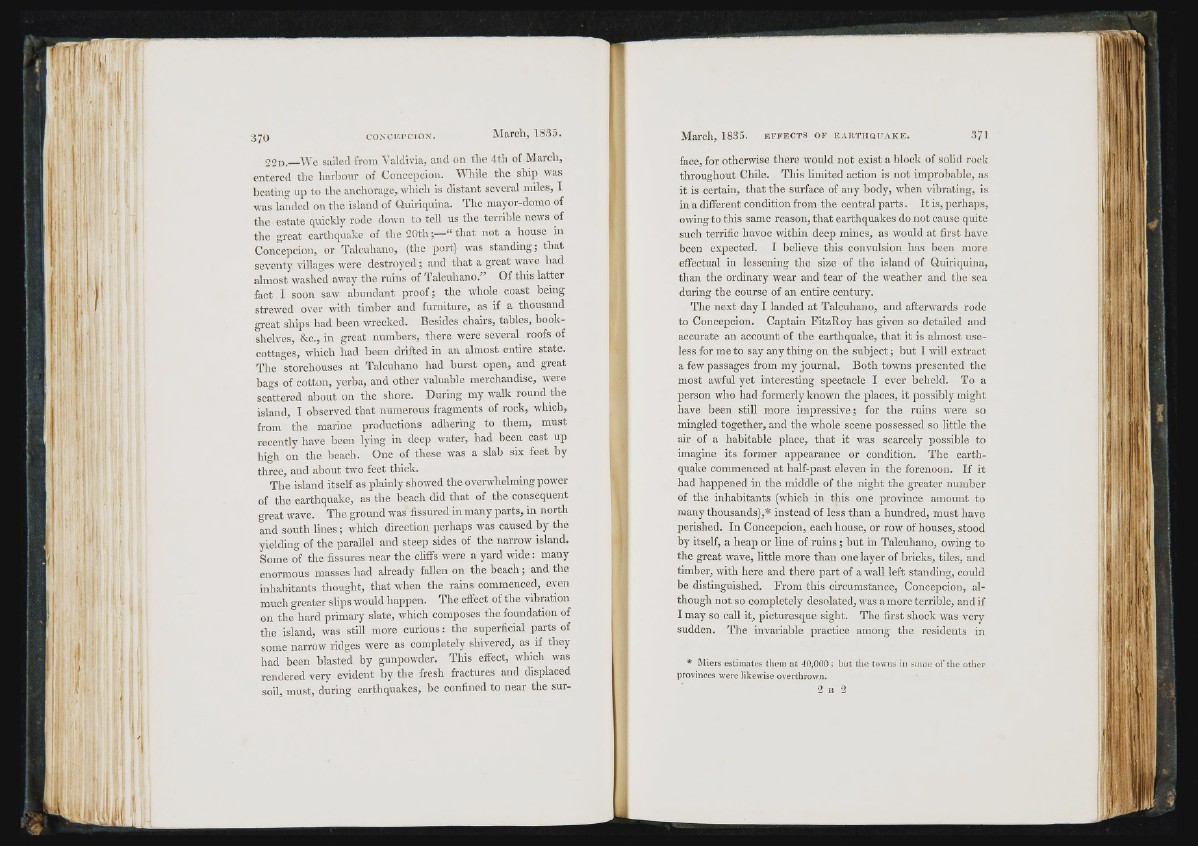
! li |l
■i I ! I;i
71, ■' H *
tl
" i
1 !
I
17 1
r i;
i .
rli
22d.—We sailed from Valdivia, and on the 4th of March,
entered the harbour of Concepcion. M’hile the ship was
beating up to the anchorage, which is distant several miles, I
was landed on the island of Quiriquina. The mayor-domo of
the estate quickly rode down to tell us the terrible news of
the great earthquake of the 2 0 th ;—“ that not a house in
Concepcion, or Talcuhano, (the port) was standing; that
seventy villages were destroyed; and that a great wave had
almost washed away the ruins of Talcuhano.” Of this latter
fact I soon saw abundant proof; the whole coast being
strewed over with timber and furniture, as if a thousand
great ships had been wrecked. Besides chairs, tables, bookshelves,
&c., in great numbers, there were several roofs of
cottages, which had been drifted in an almost entire state.
The storehouses at Talcuhano had burst open, and great
bags of cotton, yerba, and other valuable merchandise, were
scSitered about’ on the shore. During my walk round the
island, I observed that numerous fragments of rock, which,
from the marine productions adhering to them, must
recently have been lying in deep water, had been cast up
high on the beach. One of these was a slab six feet by
three, and about two feet thick.
The island itself as plainly showed the overwhelming power
of the earthquake, as the beach did that of the consequent
great wave. The ground was fissured in many parts, in north
and south lines; which direction perhaps was caused by the
yielding of the parallel and steep sides of the narrow island.
Some of the fissui-es near the cliffs were a yard wide : many
enormous masses had already fallen on the beach; and the
inhabitants thought, that when the rains commenced, even
much greater slips would happen. The effect of the vibration
on the hard primary slate, which composes the foundation of
the island, was still more curious: the superficial parts of
some narrow ridges were as completely shivered, as if they
had been blasted by gunpowder. This effect, which was
rendered very evident by the fresh fractures and displaced
soil, must, during earthquakes, be confined to near the surface,
for otherwise there would not exist a block of solid rock
throughout Chile. This limited action is not improbable, as
it is certain, that the surface of any body, when vibrating, is
in a different condition from the central parts. It is, perhaps,
owing to this same reason, that earthquakes do not cause quite
such terrific havoc within deep mines, as would at first have
been expected. I believe this convulsion has been more
effectual in lessening the size of the island of Quiriquina,
than the ordinary wear and tear of the weather and the sea
during the course of an entire century.
The next day I landed at Talcuhano, and afterwards rode
to Concepcion. Captain FitzRoy has given so detailed and
accurate an account of the earthquake, that it is almost useless
for me to say any thing on the subject; but I will extract
a few passages from my journal. Both towns presented the
most awful yet interesting spectacle I ever beheld. To a
person who had formerly known the places, it possibly might
have been stiU more impressive; for the ruins were so
mingled together, and the whole scene possessed so little the
air of a habitable place, that it was scarcely possible to
imagine its former appearance or condition. The earthquake
commenced at half-past eleven in the forenoon. If it
had happened in the middle of the night the greater number
of the inhabitants (which in this one province amount to
many thousands),* instead of less than a hundred, must have
perished. In Concepcion, each house, or row of houses, stood
by itself, a heap or line of ruins; but in Talcuhano, owing to
the great wave, little more than one layer of bricks, tiles, and
timber, with here and there part of a wall left standing, could
be distinguished. From this circumstance, Concepcion, although
not so completely desolated, was a more terrible, and if
I may so call it, picturesque sight. The first shock was very
sudden. The invariable practice among the residents in
* M ie rs e s tim a te s th em a t 4 0 ,0 0 0 ; b u t th e tow n s in some o f th e o tlie r
pro v in c e s w e re lik ew ise o v e rth row n .
2 B 2